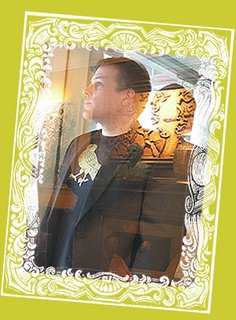VanderMeer in his own words
 Uma longa, reveladora e incisiva entrevista de Jeff VanderMeer à romancista inglesa Claire Dudman, no blogue desta – muito bom, por sinal (Janeiro de 2006). Aqui fica um excerto:
Uma longa, reveladora e incisiva entrevista de Jeff VanderMeer à romancista inglesa Claire Dudman, no blogue desta – muito bom, por sinal (Janeiro de 2006). Aqui fica um excerto:Have you ever had a life-changing event?
If so, what was it?
JV: I have had several, but I don't feel comfortable talking about the most profound of them. Most of the time a life-changing event for me has been a self-inflicted stupidity that has made me wiser or a tragedy that has made me see the world differently. But every year or two, I have what I call a kind of walking dream-time epiphany. It's where inspiration strikes so strongly that everything seems to whirl together and wherever I am, I have to sit down and write and there could be two people around me or two thousand and I don't notice them at all. These are life-changing in that they recalibrate you somewhat. You're the same but you're slightly different.
Another time, when I was out hiking and in deep forest, I came across either a jaguarandi or a Florida panther that was life-changing. Because I found I was willing to stand there and fight if I had to, which sounds hopelessly caveman, but I was glad to know that I wasn't a coward in that sense. You can be brave in that kind of situation, though, and be an emotional coward.
Generally, the life-changing events of the horrific variety come out in my dreams. When they enter my dreams and they turn to nightmares, I have to write them out of me or it becomes too much to bear.
Your new book Shriek has an unusual and very
effective structure. Can you name any important influences in your work?
JV: Shriek, structurally, is, on one level, a direct response or in dialogue with Vladimir Nabokov's Ada, in which twinned narrative voices intermingle. It is also in some structural dialogue with Views from the Oldest House by Richard Grant, which was itself an attempt to re-use the Nabokov technique with more success. I thought neither book had used the technique very successfully but thought it had potential if redeployed in a totally different context. Now, that's just one aspect of the novel, but it's an important one from a writer's point of view. I think Proust has also been an influence in that he had mastered a kind of plotless plotting. Edward Whittemore helped me in terms of an example of how you can use half-scene and summary effectively and also how to manage large stretches of time in a novel. Really, I had to learn so much to write this novel, which is one reason it took eight years to write.





2 Comments:
Here are some links that I believe will be interested
Very pretty site! Keep working. thnx!
»
Enviar um comentário
<< Home